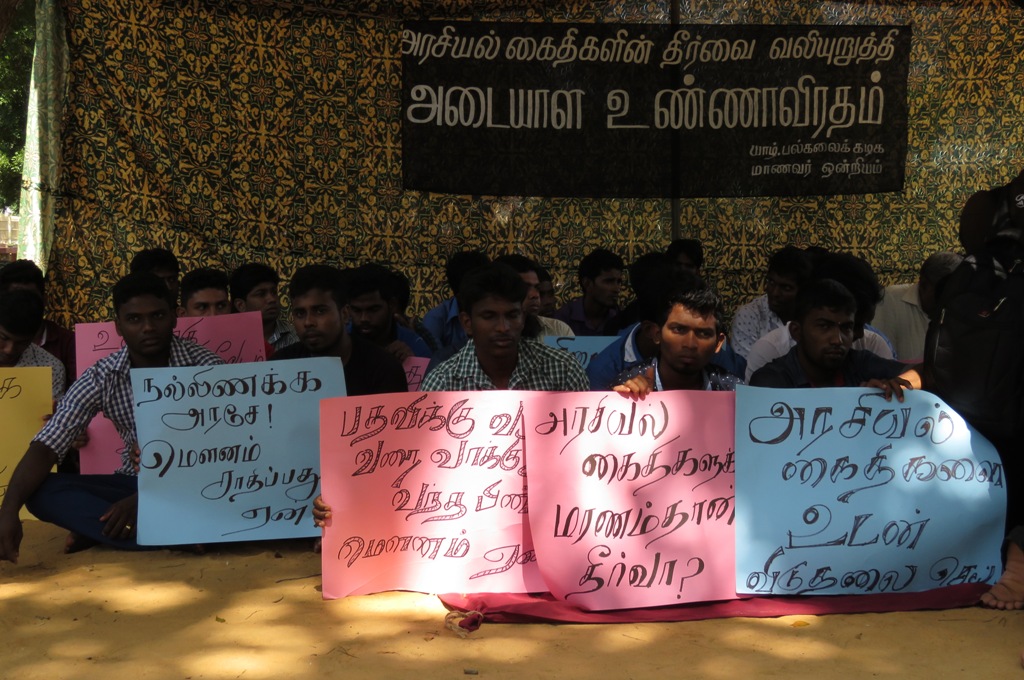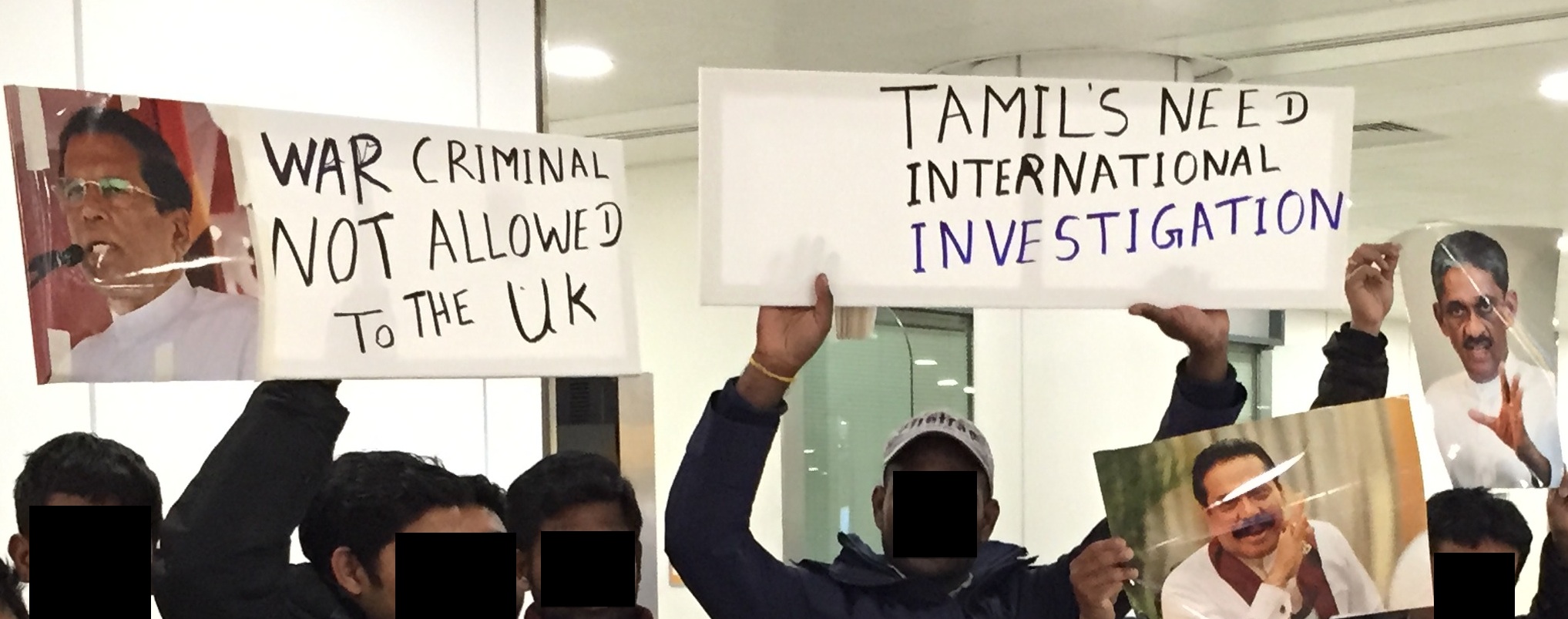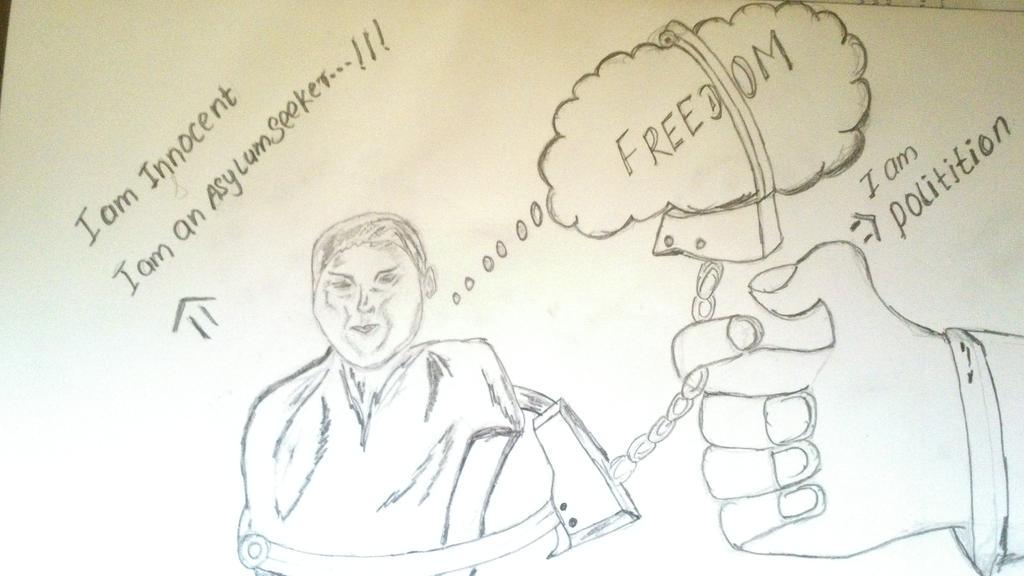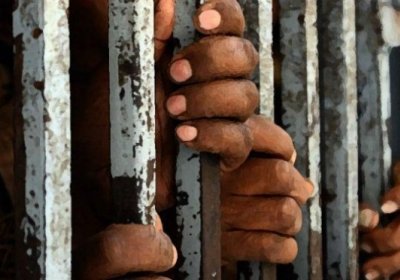 Chief minister of the Northern Provincial Council, CV Wigneswaran, addressing a commemorative event at Mullivaikkal, May 18. Photo: Tamil Guardian.
Tamils throughout the north and east of the island of Sri Lanka held ceremonies on May 18 to remember those who died in the genocidal war waged by the Sri Lankan Army against the Tamil people.
Chief minister of the Northern Provincial Council, CV Wigneswaran, addressing a commemorative event at Mullivaikkal, May 18. Photo: Tamil Guardian.
Tamils throughout the north and east of the island of Sri Lanka held ceremonies on May 18 to remember those who died in the genocidal war waged by the Sri Lankan Army against the Tamil people.
Sri Lanka
 Chief minister of the Northern Provincial Council, CV Wigneswaran, addressing a commemorative event at Mullivaikkal, May 18. Photo: Tamil Guardian.
Tamils throughout the north and east of the island of Sri Lanka held ceremonies on May 18 to remember those who died in the genocidal war waged by the Sri Lankan Army against the Tamil people.
Chief minister of the Northern Provincial Council, CV Wigneswaran, addressing a commemorative event at Mullivaikkal, May 18. Photo: Tamil Guardian.
Tamils throughout the north and east of the island of Sri Lanka held ceremonies on May 18 to remember those who died in the genocidal war waged by the Sri Lankan Army against the Tamil people.
The 12 asylum seekers who fled Sri Lanka and reached the Cocos Islands on May 2 were all arrested on arrival at Colombo airport after being deported by Australian authorities on May 5.
The group, which is believed to include children and an infant as young as one, were handed over to Sri Lanka's Criminal Investigation Department.
The immigration department refused to answer questions about the boat's arrival or the fate of its passengers, saying "we do not comment on operational matters".
 University of Jaffna students stage hunger strike in solidarity with fasting prisoners. Photo: Tamilnet.com.
Fourteen Tamil prisoners have been on hunger strike since February 22. They are demanding the release of all Tamil political prisoners and prisoners of war.
University of Jaffna students stage hunger strike in solidarity with fasting prisoners. Photo: Tamilnet.com.
Fourteen Tamil prisoners have been on hunger strike since February 22. They are demanding the release of all Tamil political prisoners and prisoners of war.
 Protest against visit of Maithripala Sirisena to Britain, March 2015.
The elaborate public facade carefully constructed by Sri Lankan President Maithripala Sirisena, with the hidden assistance of India and the US, is crumbling by the day. Instead, the discomforting truth is revealed that despite Sirisena becoming president last year, Sri Lanka remains a brutal regime dominated by a military mindset.
Protest against visit of Maithripala Sirisena to Britain, March 2015.
The elaborate public facade carefully constructed by Sri Lankan President Maithripala Sirisena, with the hidden assistance of India and the US, is crumbling by the day. Instead, the discomforting truth is revealed that despite Sirisena becoming president last year, Sri Lanka remains a brutal regime dominated by a military mindset.
 Drawing by S Nagaveeran.
From Hell to Hell
By S Nagaveeran
Writing through Fences
2015
Email fenceswritingthrough@gmail.com for copies
From Hell to Hell is the powerful new work of poems and drawings by S Nagaveeran, also known as Ravi.
In detention for 33 months in Nauru, Ravi turned to writing and drawing as a way of dealing with the emotion and despair that overwhelmed him.
Drawing by S Nagaveeran.
From Hell to Hell
By S Nagaveeran
Writing through Fences
2015
Email fenceswritingthrough@gmail.com for copies
From Hell to Hell is the powerful new work of poems and drawings by S Nagaveeran, also known as Ravi.
In detention for 33 months in Nauru, Ravi turned to writing and drawing as a way of dealing with the emotion and despair that overwhelmed him.
Since the Mu'l'livaaykkaal killings of 2009, the Tamil diaspora has mostly focused political efforts towards demanding justice for the inhuman crimes committed against Tamil civilians.
While such efforts have elevated international awareness of the gross human rights violations committed by the Sri Lankan military during the war, the approach has not yielded results on prosecuting the perpetrators of the international crimes.
 February 4 protest in Vavuniyaa.
Tamils in the north and east of Sri Lanka held protests on February 4, the former British colony's independence day.
February 4 protest in Vavuniyaa.
Tamils in the north and east of Sri Lanka held protests on February 4, the former British colony's independence day.
A six-year-old boy, Tharshan Kugathasan, was found dead near a navy base at Champoor on the east coast of Sri Lanka on January 26.
The boy's body was found in a disused well. The body had been weighed down with a large stone tied to his body by military-style shoelaces. He had earlier been seen with Sri Lankan navy personnel who used to offer him food and chocolates, according to local residents quoted by the Tamilnet website. Evidence indicates that he was raped and murdered by navy personnel.
 Tamils protest for the release of political prisoners. Colombo, October 2015.
When Maithripala Sirisena was elected as president of Sri Lanka in January last year, he promised to end human rights violations by the security forces.
Under Sirisena's predecessor, Mahinda Rajapaksa, it was common practice for the army and police to abduct people and torture them. Some were later released, while others were murdered.
Tamils protest for the release of political prisoners. Colombo, October 2015.
When Maithripala Sirisena was elected as president of Sri Lanka in January last year, he promised to end human rights violations by the security forces.
Under Sirisena's predecessor, Mahinda Rajapaksa, it was common practice for the army and police to abduct people and torture them. Some were later released, while others were murdered.
More than 300 people braved rain on January 11 in a last ditch attempt to save a Tamil family from deportation to Sri Lanka.
Neelavannan Paramanathan and his wife Suganthini fled Sri Lanka in 2008 in the midst of the civil war. They sought asylum in Australia in 2012, and settled in Ballarat with their three daughters in 2013.
There is no guarantee of their safety if they return to Sri Lanka, as violence against Tamils continues. There is well-documented evidence of harsh treatment and human rights abuses by the Sri Lankan government and military.
The entire northern province of Sri Lanka, an area mainly inhabited by Tamils, was "brought to a standstill" on November 13, according to the Tamilnet website, in support of Tamil prisoners on hunger strike for their freedom.
All private and public activities, except for medical services, came to a standstill. Students did not attend schools. Roads remained deserted except for the army and police.
About 300 Tamil political prisoners in 11 prisons began a hunger strike on October 12.
Many of the prisoners have been detained without trial under the Prevention of Terrorism Act. Some have been in jail for up to 20 years.
They are accused of being members of the Liberation Tigers of Tamil Eelam (LTTE), which fought for an independent Tamil homeland in the north and east of the island of Sri Lanka, but was defeated in 2009.
- Previous page
- Page 6
- Next page





